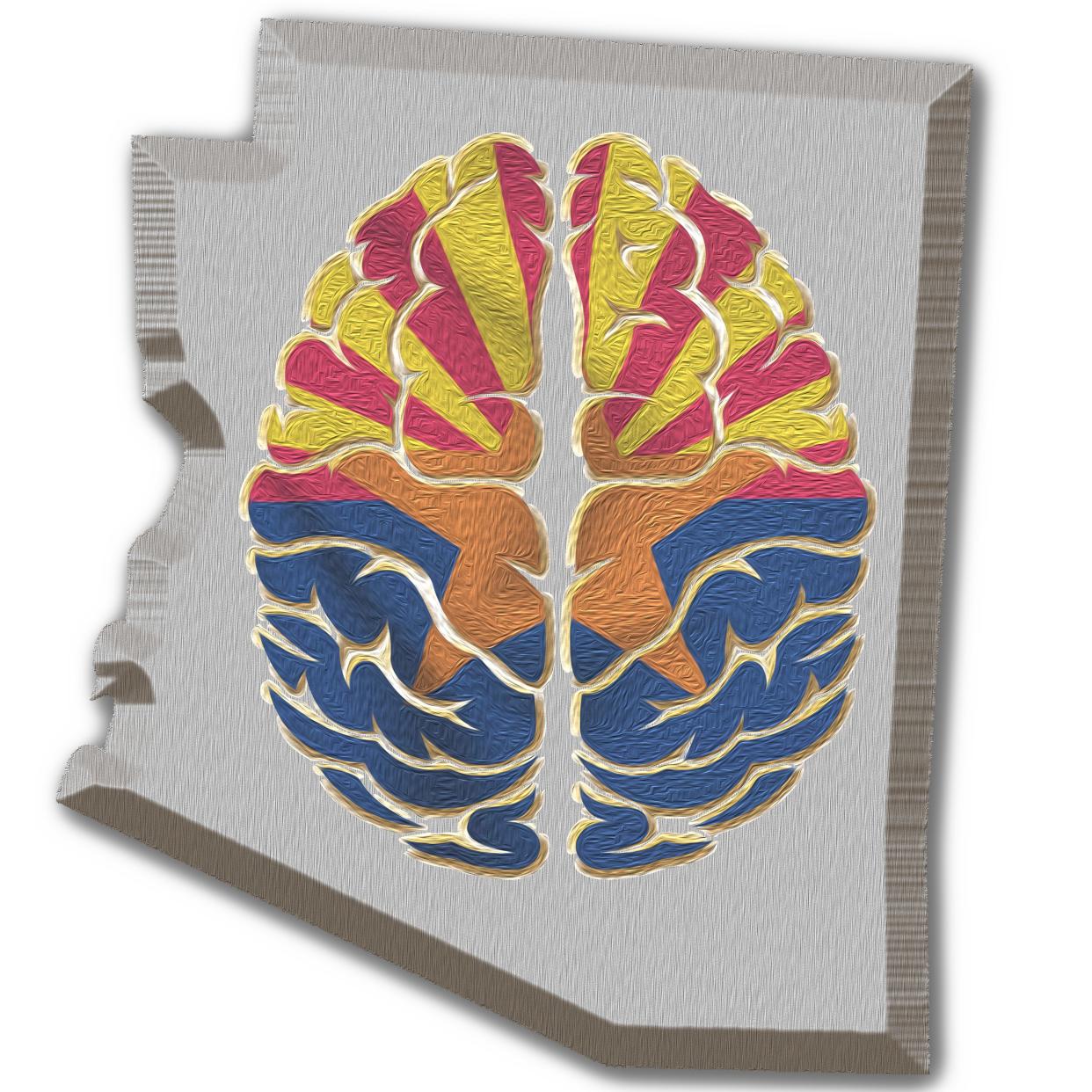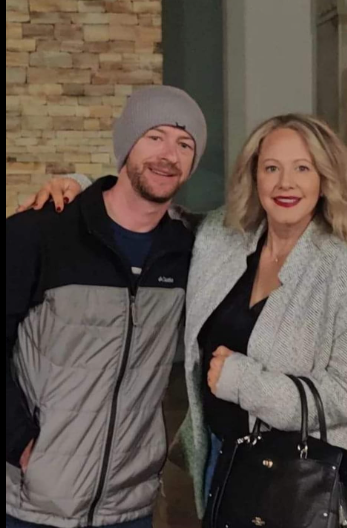Arizona is in a mental health crisis, but there are ways to improve. Here's what we know

Darren Beach has autism plus a serious mental illness, and while his family says those conditions are the underlying reasons he assaulted a health care worker while hospitalized last year, he recently was sentenced to spend a second year in a Maricopa County Jail.
Beach, 32, was featured in a June 29 story by The Arizona Republic about conditions at the Arizona State Hospital, often known as ASH, that highlighted ongoing criticism about a lack of transparency and accountability at the facility. Beach spent more than a year there as a patient until his arrest for assaulting the behavioral health worker.
His case drew attention to the hospital and also the ongoing and pervasive problem of people with serious mental illness who end up in jails and prisons across the U.S., including in Arizona.
The state hospital, a 390-bed facility is considered the highest and most restrictive level of mental health care in the state. The Phoenix hospital is the place of last resort for patients with serious mental illness, and the way it functions affects the entire mental health system in Arizona. No one is there voluntarily, and it operates on a "recovery-based" philosophy.
The aim is for patients to get stabilized and eventually return to living in the community, but critics say the treatment programs have been weakened by untrained staff, ineffective patient programming and a governance structure that lacks accountability.
Mental health advocates say improving inpatient treatment at the state hospital would go a long way in preventing Arizonans with serious, debilitating mental illness from committing crimes, from getting arrested and from ending up living on the street.
Hospital officials say patient safety and treatment are their priorities, but they are also operating with consistent staffing shortages and an increasingly complex patient population.
Arizona State Hospital CEO Mike Sheldon has stressed that the hospital is only one of hundreds of interdependent entities providing critical services in the state’s psychiatric system of care, and "any perception that the hospital is not functioning optimally is indicative of a larger set of systemic deficiencies within that care continuum."
After the Republic's story about Beach published, state Sens. Catherine Miranda, D-Phoenix, and T.J. Shope, R-Coolidge, in July wrote an op-ed calling for better oversight of the hospital, and then in November wrote a follow-up that pledged reforms, including a governance restructuring.
The chief criticism of the state hospital is that it's part of the Arizona Department of Health Services, which also regulates the hospital. There's an hospital Independent Oversight Committee, but its power is limited. And there's a governing body, but its bylaws say that the state health department director, who is appointed by the governor, is responsible for appointing members.
On Dec. 11, the Arizona Department of Health Services announced it would be expanding the number of voting members on the hospital governing body as a way of increasing transparency and accountability. But that move isn't enough for some critics like Miranda, who are questioning how independent the governing body will really be from the state Health Department.
Beach this summer pleaded to guilty aggravated assault, threats, and disorderly conduct connected with his attack on the health care worker and on Nov. 29 was sentenced to spend a second year in the Maricopa County Jail, followed by what's known as "mental health probation."
He'll be supervised in a probation program that incorporates mental health treatment.
Sommer Walter, Beach's sister and legal guardian, was satisfied with the outcome, though she's unclear about what kind of facility in Arizona will meet his needs when he's released from jail.
While she doesn't think her brother belongs behind bars, Walter said she doesn't want Beach to go back to ASH, where she worries he would get inadequate care. Beach has told his sister more than once that he preferred jail to the state hospital, she said.
Emails provided by Walter, as well as testimony she gave to the hospital's Independent Oversight Committee, indicate Walter spoke up about what she felt was subpar treatment her brother was getting at the hospital long before his arrest. Without the right balance of medication and treatment, he could get agitated and aggressive, she worried. And that's what she said happened when he assaulted the health care worker and got arrested.
Among those at Beach's sentencing were a group of Arizona women loosely calling themselves the "Mad Moms." They began showing up in 2023 at court hearings for families of individuals with serious mental illness who are in the criminal justice system, and more recently drafted a list of proposals to improve the treatment of individuals with mental illness in Arizona.
The group's organizer is Rachel Streiff, who is the guardian for an Arizona woman with serious mental illness.
Among the problems Streiff has identified in Arizona's mental health system are unsafe hospital discharges of people with serious mental illness; a lack of Medicaid reimbursement for caregivers of people with serious mental illness; and a lack of recognition from many health providers that clozapine is effective for treatment-resistant schizophrenia.
More than anything, Streiff wants Arizona legislators to place a higher priority on addressing struggles that families of people with mental illness are enduring in the state and is encouraging such families to speak up and tell their stories. She has connected with parents who have gone broke trying to pay for their child's treatment, and with families whose loved ones died shortly after being released from inpatient treatment because the facilities didn't provide them with post-discharge plans or resources to survive on their own, she said.

Among those who have connected with Mad Moms is Christen White, whose 38-year-old brother, Tucson resident Matthew Quinn, died by suicide July 7. White believes that with more effective treatment, including quality aftercare following an inpatient stay, her brother's life could have been spared.
Quinn had schizophrenia, which he acknowledged. He had a full-time job providing technical support in aircraft mechanics, and he also had private health insurance, and lived on his own. White says his death illustrates deficiencies with mental health treatment in the state.
"Matthew was the sweetest and most gentle person. He had sticky notes all over his apartment and his work computer that said, 'Don't listen to the voices,'" she said.
"He tried so hard. Ultimately, schizophrenia and the lack of competency in our mental health care took him away from us. Everyone refers to the cracks in the mental health system. … To me the system is one big crack. One big hole. You are lucky if you are able to navigate it without falling in, and if you do not have support from family, it is even worse."
After 10 months of stories about mental health in Arizona, representing nearly a year of reporting, here are seven of our key findings:
Calls for oversight reform at the Arizona State Hospital will continue in 2024
Efforts during the past two legislative sessions to ensure outside oversight of the state hospital have failed.
The state Health Department's recent announcement that it would expand the hospital governing board — an action completed by Sheldon and Arizona Gov. Katie Hobbs — is not enough to reform the state hospital, according to Miranda, who says a new law that restructures the leadership, governance and operations at the hospital is needed.
"ASH is the state's hospital, not the Department of Health Services' hospital," the state senator wrote in a text message.
Miranda said a "transparent" legislative process to reform the state hospital is needed, and she expects bills in the upcoming legislative session will focus on better oversight and governance; improved community reintegration resources; and more secure residential treatment options at the hospital.
A psychiatric bed shortage is causing problems in Phoenix
The Republic's reporting highlighted the effects of inpatient psychiatric beds that Phoenix-based Valleywise Health closed because of health care workforce shortages. Closed beds mean patients in a mental health crisis face long waits in urgent psychiatric crisis centers and in hospital emergency departments or in areas of hospitals that haven't been designated for people with serious mental health issues.
Valleywise is the public health system for Maricopa County, and it is the primary provider of inpatient psychiatric beds for Maricopa County residents who have been court-ordered to get mental health care. Maricopa County, which includes Phoenix, is the most populous county in Arizona.

As of May 11, 88 out of 411 licensed inpatient psychiatric beds operated by Valleywise were closed, most of them in the health system's hospital in Maryvale. The closed beds meant three entire psychiatric hospital units had been empty for about a year.
Officials with Valleywise say the number of closed beds is now down to 71. They are hoping to fully re-open two of the three shuttered units early in 2024.
Staffing shortages remain a problem, and it will be important to maintain a focus on expanding the behavioral health care workforce as Arizona's population continues to grow, Valleywise CEO Steve Purves wrote in a recent op-ed.
Arizona needs more First Episode Centers for young people with psychosis
The Republic on May 22 featured 28-year-old Elise Lampley in a story about first-episode programs. Evidence shows such programs give young people with schizophrenia and related disorders a chance at living independent, productive lives. The first few years after the onset of psychotic symptoms is a critical period for intervention, research shows.
But there aren't enough such programs, and more Arizonans need to be aware of them.
At least four First Episode Centers are known to be operating in the state, but population statistics indicate a need for at least 10 more programs to serve all the young people who experience psychosis in Maricopa County alone, according to Dr. Alicia Cowdry, the outpatient medical director of behavioral health services at Valleywise.
Dr. Aris Mosley, who directs the center where Lampley remains an outpatient, said first-episode programs are "crucial to the behavioral health of the future."
Lampley had been hospitalized as a psychiatric patient at least twice before getting help from the Valleywise Health First Episode Center in Avondale in early 2019, and has not been hospitalized in the four years since. Since the story about Lampley was published, Valleywise has opened a second First Episode Center in Mesa.
Cost barriers are preventing people from getting mental health care
The Republic's report about a soaring number of people seeking help for eating disorders both during and after the COVID-19 pandemic led to a follow-up story about difficulties that individuals and families encounter when they seek mental health care, including therapists and counselors.
As the Mendibles family of Tucson sought help for their adolescent daughter's eating disorder, they encountered a common problem that many Arizonans face: the counselors they found typically didn't accept insurance, but offered instead to provide a "superbill," which is an invoice for out-of-network insurance reimbursement. In other words, the Mendibles were expected to pay cash upfront and then submit the superbill to their insurance company themselves.
The problem is that there's no guarantee insurance companies will reimburse any or all of a superbill. And superbills are just one of many cost barriers for patients seeking therapy.
A shortage of mental health providers and escalated patient needs since the pandemic means any provider who doesn't take insurance likely won't have trouble finding patients willing to pay cash. As a result, many providers in Arizona don't accept Medicare, Medicaid or any commercial insurance, and that can leave some individuals and families without the care they need.
Financial obstacles to care are a problem that President Joe Biden acknowledged on July 25, when he announced a sweeping plan to improve access to mental health care. The plan is now getting pushback from insurance companies, Axios reported Oct. 18.
Veteran suicide rates in Arizona aren't improving
For the last six years, about one in every five suicides in Arizona has been a military veteran and the numbers are not getting better.
State data shows that last year, 304 veterans in Arizona took their own lives, which was the highest number since 2017, when Arizona began breaking out veterans in its statewide suicide data. The most recent federal data shows the suicide rate of 48.2 suicides per 100,000 Arizona veterans in 2021 was 30% higher than the national rate of veteran suicides, and a 22% increase over the 2020 Arizona rate.
One of the biggest barriers to reducing veteran suicides, some experts say, is the fact that so many don't get the help they need while they are in the military and then struggle after they get out. There are veterans who still hold a "suck it up" mentality they learned in the military and don't tell anyone they are suffering. Others don't know where or how to get help, or they don't qualify for help through the U.S. Department of Veterans Affairs, often known as the VA.
The VA's own research shows that 62% of the veterans who died by suicide in 2021 had not received health care from the VA during the year prior to their death.
Leaders with the nongovernmental Warrior Healing Center in Sierra Vista say often, veterans need help navigating the health system to get the help they need, and that more such assistance in that area could go a long way in suicide prevention.
"The veterans that are coming in here are not about to break because of the trauma they suffered in the war necessarily. It's whatever is daunting in their lives and the fact that they can't get the resources they need," Warrior Healing Center co-founder Cathie Goodman said.
A lack of Spanish-speaking therapists is an urgent problem
Data and anecdotal evidence suggest that while Phoenix and the U.S. as a whole are becoming increasingly diverse and multilingual, the mental health care workforce remains predominantly white and English-speaking.
Manuel Zamarippa, president of the National Latinx Psychological Association, recently told the Republic that the shortage of Spanish-speaking therapists in the U.S. is a crisis.
Nationally more than one in 10 people live in a Spanish-speaking household, the latest U.S. Census numbers show. In Phoenix, those percentages are far higher: 30% of adults ages 18 and older and 35% of children ages five through 17 live in Spanish-speaking households.
Arizonans need more support after pandemic losses
Whether it was the loss of a loved one, the fear of getting sick, or the loss of in-person school classes and normal daily routines, Arizonans continue to experience trauma from the COVID-19 pandemic.
But higher demand for mental health in the state is happening at a time when it's harder to find counselors, psychologists and other providers who are taking new patients, The Republic found.
Arizona has 947 active psychiatrists for a population of 7.3 million people, and national studies indicate the profession will undergo a wave of retirements in the next decade or so. Nine Arizona counties, all of them rural, don't have any child and adolescent psychiatrists, data from the American Academy of Child & Adolescent Psychiatry shows.
Rural areas of the state are also where suicide rates are the highest. Data from 2017 through the present show the five Arizona counties with the highest rates of suicide, in order, are all rural: Gila, La Paz, Navajo, Apache and Mohave counties.
Suicides in Arizona reached a 12-year high of 1,599 last year, a number that works out to about four deaths per day and for every completed suicide there are about seven attempts, state data shows. The data shows there were 10,560 patient visits to emergency departments and inpatient facilities in Arizona for suicide attempts last year, which works out to nearly 29 visits per day.
Reach health care reporter Stephanie Innes at Stephanie.Innes@gannett.com or at 602-444-8369. Follow her on X, formerly Twitter: @stephanieinnes.
This article originally appeared on Arizona Republic: Arizona is in a mental health crisis. Here's what needs to improve

